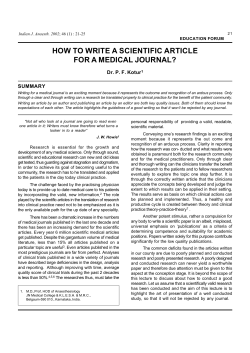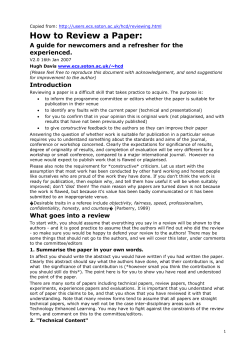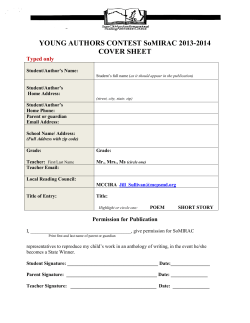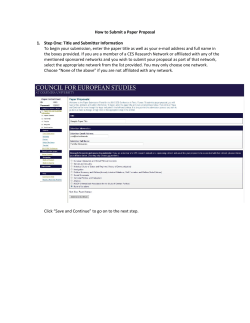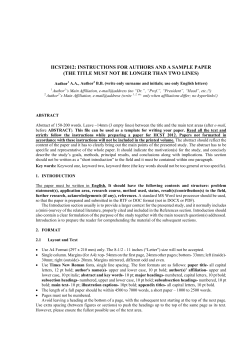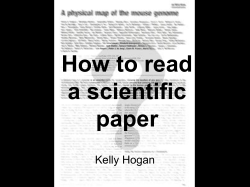
Advisory and Editorial Boards Advisory Board
Volume 26, Number 2, October 2014 Advisory and Editorial Boards Advisory Board University of Hawai‘i, USA Richard Day, Co-Editor, Reading in a Foreign Language, readfl@hawaii.edu Thom Hudson, Co-Editor, Reading in a Foreign Language, readfl@hawaii.edu Julio C Rodriguez, Director, National Foreign Language Resource Center, julio.rodriguez@hawaii.edu Kimi Kondo-Brown, Interim Associate Dean, College of Languages, Linguistics, and Literature, kondo@hawaii.edu Editorial Board Charles Alderson Neil J. Anderson Cindy Brantmeier Nathan Carr Andrew D. Cohen Averil Coxhead Greta Gorsuch William Grabe Yukie Horiba Batia Laufer John Macalister Sandra McKay Setsuko Mori David Qian Sandra Silberstein Fredricka Stoller University of Lancaster, UK Brigham Young University, USA Washington University, USA California State University, USA University of Minnesota, USA Victoria University of Wellington, New Zealand Texas Tech University, USA Northern Arizona University, USA Kanda University of International Studies, Japan University of Haifa, Israel Victoria University of Wellington, New Zealand San Francisco State University, USA Kinki University, Japan Hong Kong Polytechnic University, Hong Kong University of Washington, USA Northern Arizona University, USA c.alderson@lancaster.ac.uk neil_anderson@byu.edu cbrantme@wustl.edu ncarr@exchange.fullerton.edu adcohen@umn.edu averil.coxhead@vuw.ac.nz greta.gorsuch@ttu.edu william.Grabe@nau.edu horiba@kanda.kuis.ac.jp batialau@research.haifa.ac.il John.Macalister@vuw.ac.nz smckay@sfsu.edu setsukomori@mac.com David.Qian@polyu.edu.hk tq@u.washington.edu Fredricka.Stoller@NAU.EDU Editorial Staff Editors: Richard Day and Thom Hudson, University of Hawai’i, readfl@hawaii.edu Reviews Editor: Anne Burns, Macquarie University, anne.burns@mq.edu.au Readings on L2 Reading Editor: Cindy Brantmeier, Washington University, cbrantme@wustl.edu Assistant Editors: Eunseok Ro, University of Hawai’i, readfl@hawaii.edu Web Production Editors: Eunseok Ro, University of Hawai’i, readfl@hawaii.edu Copyright © RFL 2014 About Reading in a Foreign Language The online journal Reading in a Foreign Language (RFL) is a scholarly international refereed journal originally founded as a print journal in 1983 at the University of Aston, Birmingham, England. The journal moved to the University of Hawai‘i in 2002 under the co-editorship of Richard R. Day and Thom Hudson, and Reviews Editor Anne Burns, Macquarie University, Australia. It is supported by the National Foreign Language Resource Center (NFLRC), the University of Hawai‘i College of Languages, Linguistics and Literature, and the University of Hawai‘i Department of Second Language Studies. Reading in a Foreign Language has established itself as an excellent source for the latest developments in the field, both theoretical and pedagogic, including improving standards for foreign language reading. This fully-refereed journal is published twice a year, in April and October. The editors seek manuscripts concerning both the practice and theory of learning to read and the teaching of reading in any foreign or second language. Reviews of scholarly books and teaching materials, conference reports, and discussions are also solicited. The language of the journal is English, but lexical citations of languages other than English are acceptable. Additionally, the journal encourages research submissions about reading in languages other than English. From time to time, special issues are published on themes of relevance to our readers. Please see our submission guidelines for more information. Although RFL is a free online journal, we would appreciate your support as a subscriber. This will assist us in continuing to obtain institutional support for the journal, keeping it free of charge. Please take a few minutes to visit our subscription page. Copyright © RFL 2014 Information for Contributors Reading in a Foreign Language (RFL) seeks submissions of previously unpublished manuscripts on any topic related to the area of foreign or second language reading. Articles should be written so that they are accessible to a broad audience of language educators, including those individuals who may not be familiar with the particular subject matter addressed in the article. Manuscripts are being solicited in these three major categories: articles, discussion forum, and reviews. Submission guidelines, general publication policies, general guidelines for reporting on both quantitative and qualitative research are provided below. Articles Discussion Forum Reviews Features Submission Guidelines General Publication Policies Guidelines for Reporting on Research Articles Articles should report original research or present an original framework that links previous research, educational theory, and teaching practices. Full-length articles should be no more than 8,500 words in length, excluding appendices. Additionally, each submission should include an abstract of no more than 150 words, and a list of five to seven keywords for index and search purposes. We encourage articles that take advantage of the electronic format by including hypermedia links to multimedia material both within and outside the article. All article manuscripts submitted to RFL go through a two-step review process. Step 1: Internal review. The editors of the journal first review each manuscript to see if it meets the basic requirements for articles published in the journal (i.e., that it reports on original research or presents an original framework linking previous research, educational theory, and teaching practices), and that it is of sufficient quality to merit external review. Note that RFL follows the guidelines of the sixth edition of the Publication Manual of the American Psychological Association published by the American Psychological Association (APA). Manuscripts submitted to RFL must conform to APA format. Manuscripts that do not meet these requirements are not sent out for further review. This internal review takes about 1–2 weeks. Copyright © RFL 2014 Step 2: External review. Submissions that meet the requirements above are then sent out for blind peer review from two to three experts in the field, either from the journal’s editorial board or from a larger list of reviewers. This second review process takes 2–3 months. Following the external review, the authors are sent copies of the external reviewers’ comments and are notified as to the decision (accept as it is, accept pending changes, revise and resubmit, or reject). Discussion Forum Short articles, usually no more than 2,000 words, in the Discussion Forum generally discuss material previously published in RFL and may also present replies by the authors to the issues raised in those comments. The Discussion Forum contents are meant to be constructive and professional exchanges about an area of foreign language reading. Discussions go through the same review process as that for full length articles. Reviews The journal welcomes reviews of recent publications and resources focusing on a variety of aspects of reading, including research, professional development, classroom approaches, teaching texts, and computer mediated materials. Reviewers should give a clear and succinct description and provide the reader with the means of evaluating the relevance of the material to the targeted field of theory and practice. Reviews should normally include references to published theory and relevant research, and reviews providing a critical or evaluative overview of several publications that have made a distinct contribution to the field of reading research and practice are particularly welcome. Reviews of individual books or reading instructional software are generally 1,200–1,600 words in length. Reviews of multiple texts can be longer. Reviews should include the name, institutional affiliation, e-mail address, URL (if applicable), and a short biographical statement (maximum 50 words) of the reviewer(s). The following information should be included in a table at the beginning of the review: Author(s) Title Publication date Publisher Publisher city and country Number of pages ISBN Price Contact Anne Burns if you are interested in having material reviewed or in serving as a reviewer. Anne Burns Department of Linguistics Macquarie University Sydney Australia anne.burns@mq.edu.au Copyright © RFL 2014 Features RFL has two features, Readings on L2 Reading: Publications in Other Venues, which first appeared in the October 2005 issue, and RFL Revisited: Past Articles Today, which started in the October 2006 issue. Both features appear once a year in the October issue. Readings on L2 Reading: Publications in Other Venues offers an archive of articles published in other venues during the previous year and will serve as a valuable tool to readers of RFL. Articles may treat any topic within the scope of RFL and second language reading. Articles are organized by topic. This feature includes titles of the articles as well as brief summaries. Two additional sections include a list of books, volumes, and dissertations that treat second language reading. For more information, please contact the editor for this feature, Cindy Brantmeier, an associate professor of applied linguistics and Spanish, Washington University in St. Louis. RFL readers are requested to send to Dr. Brantmeier relevant information on appropriate articles such as author(s), journal, date of publication, and, if possible, a brief summary. Please send to cbrantme@wustl.edu RFL Revisited: Past Articles Today brings previous RFL articles that remain relevant and reprises them in current issues. We ask the author to comment on the article as well as to have others comment on it. Note that RFL does not accept unsolicited submissions for this feature. Submission Guidelines Please list the names, institutions, e-mail addresses of all authors, and also include a brief biographical statement (maximum 50 words, in sentence format) for each author. (This information will be removed when the articles are distributed for blind review.) Authors must accompany their submission with a statement that the manuscripts has not been published elsewhere or is not being considered for publication elsewhere. Submissions may be submitted in the following formats: (a) Microsoft Word documents and (b) RTF documents. If a different format is required in order to better handle foreign language fonts, please consult with the editors. Submissions can be transmitted in either of the following ways: 1. By electronic mail: Send the main document and any accompanying files (images, etc.) to readfl@hawaii.edu 2. By mail: Send the material on a disk to the following address: RFL NFLRC University of Hawai‘i at Mānoa 1859 East-West Road, #106 Honolulu, HI 96822 USA Please check the General Publication Policies below for additional guidelines. Copyright © RFL 2014 General Publication Policies The following policies apply to all articles, reviews, and commentaries: 1. All submissions must conform to the requirements of the Publication Manual of the American Psychological Association (6th edition). Authors are responsible for the accuracy of references and citations, which must be in APA format. Manuscripts may be rejected if they do not meet APA requirements. 2. Manuscripts that have already been published elsewhere or are being considered for publication elsewhere are not eligible to be considered for publication in RFL. It is the responsibility of the author to inform the editor of the existence of any similar work that is already published or under consideration for publication elsewhere. 3. Authors of accepted manuscripts will assign to RFL the permanent right to electronically distribute the article. 4. The editors of RFL reserve the right to make editorial changes in any manuscript accepted for publication for the sake of style or clarity. Authors will be consulted only if the changes are substantial. 5. Articles are copyrighted by their respective authors, but if published after electronic appearance, RFL will be acknowledged as the initial locus of publication. 6. The views expressed in RFL do not necessarily represent the views of the National Foreign Language Resource Center, the University of Hawai‘i College of Language, Linguistics, and Literature, or the University of Hawai‘i Department of Second Language Studies. 7. RFL expects authors to adhere to ethical standards for research involving human subjects. Manuscript contributors will provide a statement to RFL stating that: 1) They have adhered to the human subject review established by their institution OR 2) If their institution does not have an institutional review process, or if the institutional review process does not include the following procedures, contributors must meet the following standards. Research Standards A. Participants have been informed that they are research subjects and the results of the study will be presented for publication. B. Participants have been informed that participation is voluntary and that they may withdraw their participation at any time. C. Participants have been informed of the purpose of the research and provided a general outline of the project. D. Participants have been informed how their confidentiality will be maintained. E. Participants have been informed of any potential risks. Copyright © RFL 2014 F. Participants, or their guardian, have signed an informed consent form for their participation in the study. RFL Guidelines for Reporting on Research Research should generally include the following sections: An Abstract (no more than 120 words) Five to seven keywords for index and search purposes An Introduction: 1. stating the research issue to be investigated 2. presenting the underlying theoretical framework discussing how the research fits with previous research 3. presenting a description of the methodological tradition in which the study was conducted for qualitative research 4. defining the variables 5. stating the research hypotheses A Method section: 1. 2. 3. 4. describing the participants or subjects and research site presenting a detailed description of data collection and analysis procedures describing the apparatus or materials used explaining the procedures and summarizing the steps employed in the research A Results section: 1. presenting graphs and tables that help to explain the results 2. for quantitative research, presenting descriptive and inferential statistics used to analyze the data, including the following: (a) the reliability of the instruments used, (b) the statistic used, (c) statistical significance and effect size indicators of the results obtained, (d) how all statistical assumptions were met 3. for qualitative research, data should reflect prolonged engagement, persistent observation, and triangulation, with “thick description” A Discussion section: 1. presenting an evaluation and interpretation of the results 2. discussing alternative explanations when appropriate 3. causal inferences should be cautiously made, and not based solely on correlational approaches 4. results of the study should not be overly interpreted or generalized 5. linking the results obtained in the study to original hypotheses Copyright © RFL 2014 6. presenting the implications and any limitations of the study A Conclusion: 1. including a summary and general implications of the study 2. proposing suggestions for further research References in APA format Appendices of instrument(s) used Contact RFL Reading in a Foreign Language National Foreign Language Resource Center 1859 East-West Road #106 University of Hawai‘i at Mānoa Honolulu, HI 96822 USA readfl@hawaii.edu Copyright © RFL 2014
© Copyright 2025

